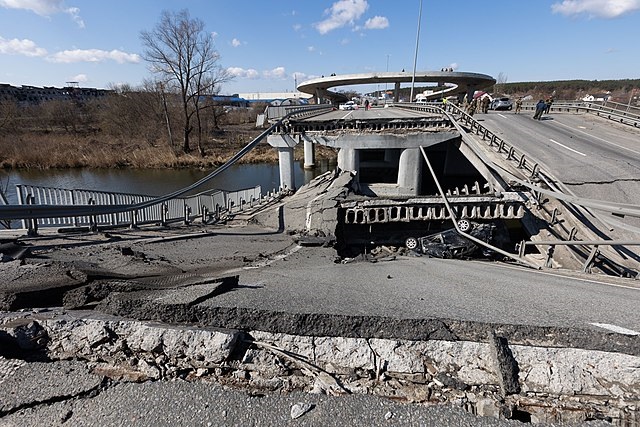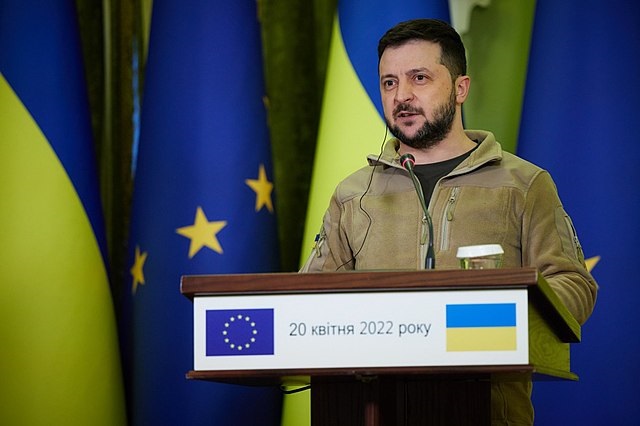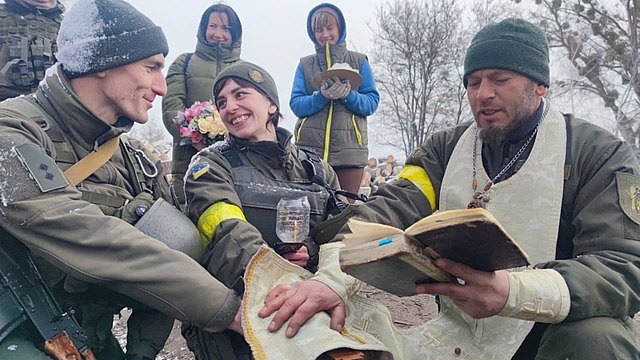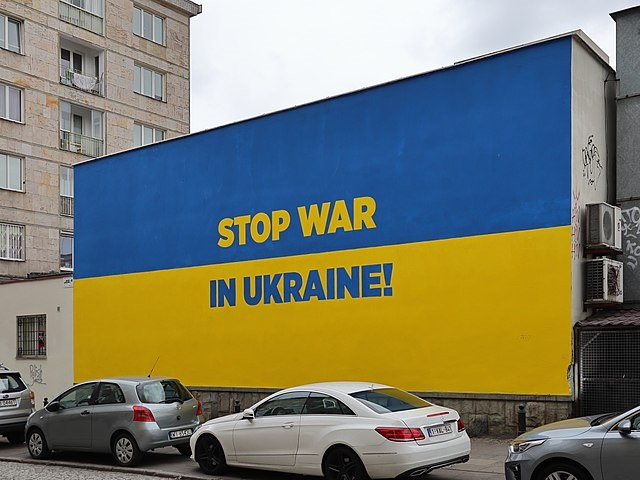Ukrainian soldiers pray together.
 By FARLEY O’BRIEN
By FARLEY O’BRIEN
In global events such as the war between Ukraine and Russia, the world too often focuses on the political aspects of the problem.
It is easy to view a foreign conflict as a distant engagement between two opposing countries, and to forget that there are real people being affected. In Ukraine, ordinary people are being made to suffer, and before their eyes their lives and homes have been made into a war zone.
Such is the story of Mark Shevchuk, who has spent the last few months watching his home become a battleground.
Growing up in Odessa, Ukraine, Mark moved to the United States a decade ago to study English and become a translator. While originally planning to only stay a few months, he quickly fell in love with the U.S.
At the behest of his parents, who insisted that Ukraine was becoming dangerous due to increasing tension with Russia, Mark made the decision to remain in the United States and currently lives in Margate.
When news of potential conflict between Ukraine and Russia first surfaced, Mark believed that it would just be another instance of Russia using scare tactics to pressure Ukraine into ceding territory, similar to what they had done 10 years before in Crimea. But this time, Mark was wrong.
On the morning of Feb. 24, Mark awoke to a series of alarming text messages from his friends: “Praying for your parents,” they empathized.
Russia had invaded Ukraine. After hearing about the invasion, Mark immediately called his parents, who were terrified. Borders and airports were closing, and they felt trapped in the country.
From that day forward, Mark has been doing everything in his power to get his parents to safety.

Ukrainian President Volodymyr Zelensky.
Mark’s parents tried to escape Ukraine, but were stopped at the border by Ukrainian soldiers and told that Mark’s father was not allowed to leave. Even at 56 years old, he was still eligible for the military draft. Until he turns 60 years old, the draft cutoff, he is forced to remain in the country.
As the only parent allowed to leave Ukraine, Mark’s mother faced the impossible decision between staying in a dangerous area or escaping and leaving her husband of 30 years behind.
She called Mark to ask for his advice, but he was hesitant to put pressure on her to leave Ukraine.
“I wanted it to be her decision,” insisted Mark.
However, growing violence made her choice urgent. “I can’t lose two parents,” Mark finally told her over the phone. If his dad must stay, it was important to him that at least one parent reach safety.
In March, Mark’s mother fled Ukraine to the safety of nearby Moldova. Without her husband, friends, or family from Ukraine, she was alone in a foreign country. Once she was there, Mark helped her apply for a U.S. visa.
“She is practicing English every night, hoping she can come see me one day,” Mark said.
Hoping to make this dream a reality, he has also helped his mother apply for a Canadian visa.
In the meantime, she is staying in Chisinau, Moldova, in a refugee camp with fellow Ukrainians.
While relatively safer than Ukraine, Moldova faces dangers of its own. Russian control over parts of the country would make it easier to send soldiers into Ukraine, and Moldova fears a pending invasion.

Ukrainian soldiers pray together.
Now alone in a foreign country, Mark worries that his mother will soon be made to face the same violence that caused her to flee Ukraine, this time without anyone there to help her.
His father remains in Odessa, Ukraine, where the situation is gradually worsening. Odessa is the third largest city in Ukraine and is located on the Black Sea, making it a desirable location for Russia. Control over Odessa would provide strategic access to the city’s ports, making it easier for Russia to take control over more of Ukraine.
While the city was previously one of the safer areas in the country, five weeks ago Russia started bombing the area. Mark’s father no longer feels safe in the city, and he avoids leaving his home as much as possible.
He tells Mark of food shortages and inflation of vital goods, with necessities like milk selling for almost triple the usual price. Bomb alarms sound periodically, sending people fleeing to shelters.
Families bring their children to sleep in subways, desperate for a place safe from potential explosions. Citizens of Odessa live in fear of a possible bombing of a factory near Odessa, which would result in the release of deadly radiation.
“They’re not military. They’re just regular people trying to find a safer place,” Mark said.
He speaks with his father as much as possible, making sure that his mother does the same. Since his father is still prohibited to flee the country because of the draft, Mark is unable to help him apply for a visa. He fears that his father will get drafted if the situation gets worse, despite his age.
“There’s nothing really I can do,” admitted Mark solemnly. “I don’t see the end; I think people are just going to keep dying.”

A large mural calls for an end to the war.
In addition to his concern for his parents, Mark also expressed a feeling of betrayal from Russia. He references the many treaties and agreements between the two countries, which dictate that Ukraine and Russia will remain separate and peaceful toward each other.
Ukraine even gave up its nuclear bombs to Russia, the same means of destruction that Russia now threatens to use against Ukraine.
Despite Mark’s feeling of helplessness about the situation, he is grateful for the support that the United States has provided.
“If Ukraine doesn’t have any help, Russia will probably take over within days,” he said gravely. “I hope they are going to keep sending equipment and all of that stuff.”
Thanks to the support of the United States and other countries involved, Mark believes that Ukraine was underestimated by Russia.
“Putin did not expect us to defend Ukraine this way,” he said.
He is thankful for all that the assisting countries have done, and he continues to hold hope that it will eventually lead to the reunion of his family.
 By FARLEY O’BRIEN
In global events such as the war between Ukraine and Russia, the world too often focuses on the political aspects of the problem.
It is easy to view a foreign conflict as a distant engagement between two opposing countries, and to forget that there are real people being affected. In Ukraine, ordinary people are being made to suffer, and before their eyes their lives and homes have been made into a war zone.
Such is the story of Mark Shevchuk, who has spent the last few months watching his home become a battleground.
Growing up in Odessa, Ukraine, Mark moved to the United States a decade ago to study English and become a translator. While originally planning to only stay a few months, he quickly fell in love with the U.S.
At the behest of his parents, who insisted that Ukraine was becoming dangerous due to increasing tension with Russia, Mark made the decision to remain in the United States and currently lives in Margate.
When news of potential conflict between Ukraine and Russia first surfaced, Mark believed that it would just be another instance of Russia using scare tactics to pressure Ukraine into ceding territory, similar to what they had done 10 years before in Crimea. But this time, Mark was wrong.
On the morning of Feb. 24, Mark awoke to a series of alarming text messages from his friends: “Praying for your parents,” they empathized.
Russia had invaded Ukraine. After hearing about the invasion, Mark immediately called his parents, who were terrified. Borders and airports were closing, and they felt trapped in the country.
From that day forward, Mark has been doing everything in his power to get his parents to safety.
By FARLEY O’BRIEN
In global events such as the war between Ukraine and Russia, the world too often focuses on the political aspects of the problem.
It is easy to view a foreign conflict as a distant engagement between two opposing countries, and to forget that there are real people being affected. In Ukraine, ordinary people are being made to suffer, and before their eyes their lives and homes have been made into a war zone.
Such is the story of Mark Shevchuk, who has spent the last few months watching his home become a battleground.
Growing up in Odessa, Ukraine, Mark moved to the United States a decade ago to study English and become a translator. While originally planning to only stay a few months, he quickly fell in love with the U.S.
At the behest of his parents, who insisted that Ukraine was becoming dangerous due to increasing tension with Russia, Mark made the decision to remain in the United States and currently lives in Margate.
When news of potential conflict between Ukraine and Russia first surfaced, Mark believed that it would just be another instance of Russia using scare tactics to pressure Ukraine into ceding territory, similar to what they had done 10 years before in Crimea. But this time, Mark was wrong.
On the morning of Feb. 24, Mark awoke to a series of alarming text messages from his friends: “Praying for your parents,” they empathized.
Russia had invaded Ukraine. After hearing about the invasion, Mark immediately called his parents, who were terrified. Borders and airports were closing, and they felt trapped in the country.
From that day forward, Mark has been doing everything in his power to get his parents to safety.

 Ukrainian soldiers pray together.
Now alone in a foreign country, Mark worries that his mother will soon be made to face the same violence that caused her to flee Ukraine, this time without anyone there to help her.
His father remains in Odessa, Ukraine, where the situation is gradually worsening. Odessa is the third largest city in Ukraine and is located on the Black Sea, making it a desirable location for Russia. Control over Odessa would provide strategic access to the city’s ports, making it easier for Russia to take control over more of Ukraine.
While the city was previously one of the safer areas in the country, five weeks ago Russia started bombing the area. Mark’s father no longer feels safe in the city, and he avoids leaving his home as much as possible.
He tells Mark of food shortages and inflation of vital goods, with necessities like milk selling for almost triple the usual price. Bomb alarms sound periodically, sending people fleeing to shelters.
Families bring their children to sleep in subways, desperate for a place safe from potential explosions. Citizens of Odessa live in fear of a possible bombing of a factory near Odessa, which would result in the release of deadly radiation.
“They’re not military. They’re just regular people trying to find a safer place,” Mark said.
He speaks with his father as much as possible, making sure that his mother does the same. Since his father is still prohibited to flee the country because of the draft, Mark is unable to help him apply for a visa. He fears that his father will get drafted if the situation gets worse, despite his age.
“There’s nothing really I can do,” admitted Mark solemnly. “I don’t see the end; I think people are just going to keep dying.”
Ukrainian soldiers pray together.
Now alone in a foreign country, Mark worries that his mother will soon be made to face the same violence that caused her to flee Ukraine, this time without anyone there to help her.
His father remains in Odessa, Ukraine, where the situation is gradually worsening. Odessa is the third largest city in Ukraine and is located on the Black Sea, making it a desirable location for Russia. Control over Odessa would provide strategic access to the city’s ports, making it easier for Russia to take control over more of Ukraine.
While the city was previously one of the safer areas in the country, five weeks ago Russia started bombing the area. Mark’s father no longer feels safe in the city, and he avoids leaving his home as much as possible.
He tells Mark of food shortages and inflation of vital goods, with necessities like milk selling for almost triple the usual price. Bomb alarms sound periodically, sending people fleeing to shelters.
Families bring their children to sleep in subways, desperate for a place safe from potential explosions. Citizens of Odessa live in fear of a possible bombing of a factory near Odessa, which would result in the release of deadly radiation.
“They’re not military. They’re just regular people trying to find a safer place,” Mark said.
He speaks with his father as much as possible, making sure that his mother does the same. Since his father is still prohibited to flee the country because of the draft, Mark is unable to help him apply for a visa. He fears that his father will get drafted if the situation gets worse, despite his age.
“There’s nothing really I can do,” admitted Mark solemnly. “I don’t see the end; I think people are just going to keep dying.”
 A large mural calls for an end to the war.
In addition to his concern for his parents, Mark also expressed a feeling of betrayal from Russia. He references the many treaties and agreements between the two countries, which dictate that Ukraine and Russia will remain separate and peaceful toward each other.
Ukraine even gave up its nuclear bombs to Russia, the same means of destruction that Russia now threatens to use against Ukraine.
Despite Mark’s feeling of helplessness about the situation, he is grateful for the support that the United States has provided.
“If Ukraine doesn’t have any help, Russia will probably take over within days,” he said gravely. “I hope they are going to keep sending equipment and all of that stuff.”
Thanks to the support of the United States and other countries involved, Mark believes that Ukraine was underestimated by Russia.
“Putin did not expect us to defend Ukraine this way,” he said.
He is thankful for all that the assisting countries have done, and he continues to hold hope that it will eventually lead to the reunion of his family.
A large mural calls for an end to the war.
In addition to his concern for his parents, Mark also expressed a feeling of betrayal from Russia. He references the many treaties and agreements between the two countries, which dictate that Ukraine and Russia will remain separate and peaceful toward each other.
Ukraine even gave up its nuclear bombs to Russia, the same means of destruction that Russia now threatens to use against Ukraine.
Despite Mark’s feeling of helplessness about the situation, he is grateful for the support that the United States has provided.
“If Ukraine doesn’t have any help, Russia will probably take over within days,” he said gravely. “I hope they are going to keep sending equipment and all of that stuff.”
Thanks to the support of the United States and other countries involved, Mark believes that Ukraine was underestimated by Russia.
“Putin did not expect us to defend Ukraine this way,” he said.
He is thankful for all that the assisting countries have done, and he continues to hold hope that it will eventually lead to the reunion of his family.